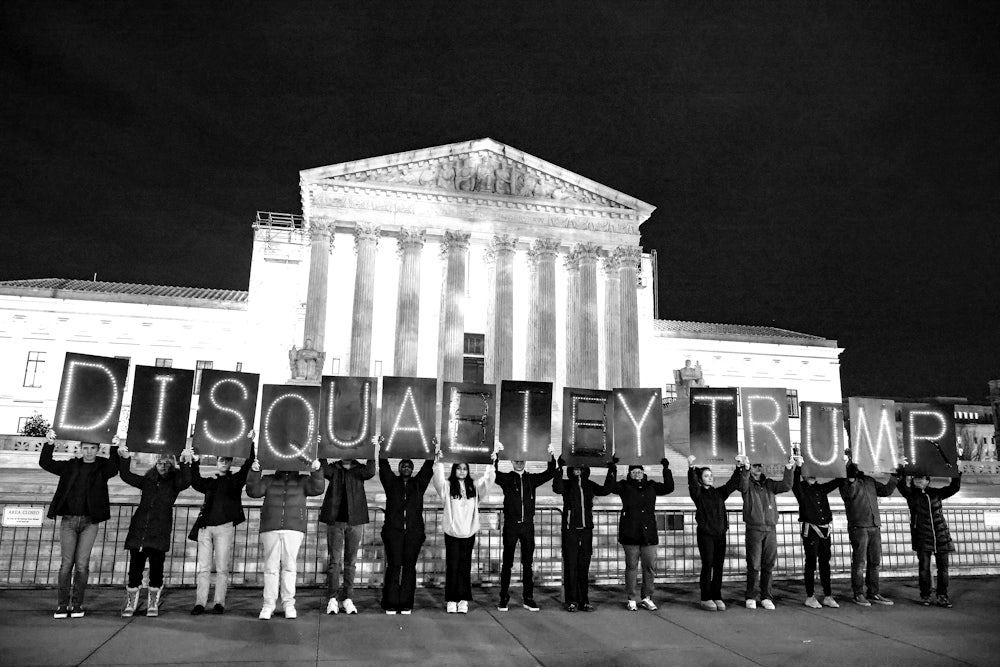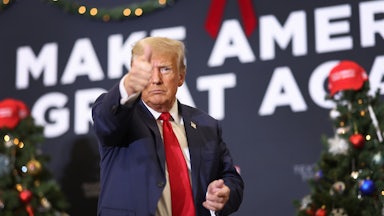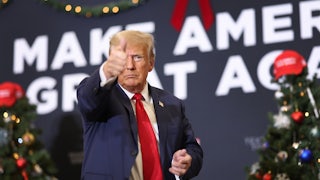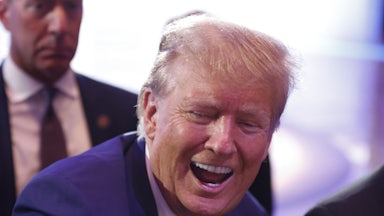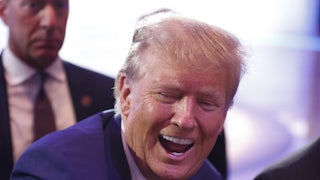Something extraordinary is set to happen on Thursday: The Supreme Court will interpret part of the Constitution for the first time. Neither the justices nor any of their predecessors have ever heard a case about the disqualification clause, a post–Civil War provision in the Fourteenth Amendment that bars participants in “insurrection or rebellion” from holding political office. The court is stepping out into freshly fallen snow.
The stakes in Trump v. Anderson could not be higher. In December, Colorado’s highest court ruled that former President Donald Trump met the disqualification clause’s threshold for exclusion. If the Supreme Court agrees with that decision, Trump would no longer be able to run for president in 2024, a ruling that would crack open the fault lines of the American political landscape.
Roughly 80 different friend-of-the-court briefs have been filed so far, reflecting the kaleidoscopic interests in the case. Some are threadbare and legally uninteresting; others are performative and analytically useless. Taken together, however, they provide a rich portrait of how the court will delve into the layers of overlapping legal and constitutional questions in what could be the most important case of its term.
Since the court has never heard a disqualification clause case before, it will likely have to approach each aspect of it in depth. Three questions loom larger over the arguments than any others: whether the president is an “officer of the United States,” whether Trump “engaged in insurrection,” and whether the disqualification clause is self-enforcing—that is, whether further action by Congress is needed before it can take effect.
Perhaps the most prominent argument made by Trump and his defenders is that the president is not “an officer of the United States.” The disqualification clause’s text lays out the categories of persons that it covers: If someone took a constitutional oath as a “member of Congress, or as an officer of the United States, or as a member of any state legislature, or as an executive or judicial officer of any state,” and they engage in “insurrection or rebellion,” then they are disqualified from being “a senator or representative in Congress, or elector of president and vice-president, or hold any office, civil or military, under the United States, or under any state.”
The Colorado Supreme Court concluded that presidents fall under the “officer of the United States” catchall term for both groups of offices. The majority of judges concluded that other portions of the Constitution would not make sense if they abided by Trumpworld’s belief that the president was not an “officer of the United States.” They noted, as examples, that this reading would suggest presidents weren’t bound by the emoluments clause, the constitutional ban on serving in two branches of government at once, or even the Senate’s power to disqualify anyone convicted by them in an impeachment trial.
Two conservative law professors, Seth Barrett Tillman and Josh Blackman, have urged the justices to adopt this reading nonetheless. Their reasoning is based on a scattered assortment of uses of “officer of the United States” in unrelated cases and issues, as well as some unimpressive contemporary evidence. While specious at best, their reasoning has also defined Trumpworld’s approach to the case, and if Trump prevails, it will likely suffuse the Supreme Court’s ruling.
The two scholars’ posture is purportedly originalist, albeit without the usual heft of historical evidence. “Indeed, to date, the [plaintiffs] have not produced a record of anyone stating that the president is an ‘officer of the United States’ for purposes of Section 3,” Tillman and Blackman wrote. “None. But in April 1868, while ratification of the Fourteenth Amendment remained ongoing, a Louisville newspaper, citing the Commissions and Impeachment Clauses, argued that the President was not an ‘officer of the United States.’”
By some estimates, there were roughly 5,900 newspapers in America when the Fourteenth Amendment was ratified. It is unclear why one particular newspaper in Kentucky deserves such weighty consideration. Abiding by its unpersuasive reading would also mean accepting the more absurd outcome: that the Fourteenth Amendment’s drafters thought it was unacceptable for rebels, insurrectionists, and ex-Confederates to serve as official dogcatcher for a rural town in Maine but acceptable for them to serve as president of the United States.
As for the other absurdities that the Colorado Supreme Court envisioned, Tillman and Blackman largely welcome them. They argued that, yes, a president could simultaneously serve in Congress and even that impeachment by the House and conviction by the Senate does not work, either. “As a result, a person impeached, convicted, and disqualified could serve in Congress or the presidency,” they wrote. “The Colorado Supreme Court found this position ‘nonsensical,’ but did not cite any evidence of original meaning.” If only the judges had read the April 1868 issues of the Louisville Daily Journal in law school.
Even then, the inconsistencies still stack up. “The Religious Test Clause provides that ‘no religious test shall ever be required as a qualification to any office or public trust under the United States,’” they noted at one point. “The President and members of Congress hold a ‘public trust.’ The Religious Test Clause extends to these public trusts.” But that reasoning does not appear to apply to the other clauses in their view, which similarly refer to “offices of trust.” Is it because they are described as “trusts” instead of “public trusts”? Does that distinction matter? Does it even really exist? One cannot help but feel that Tillman and Blackman are starting from their preferred end point and working backward from there, elevating random nineteenth-century newspapers to the status of the Federalist Papers and reading absurdities into every corner of the Constitution.
Trumpworld also challenged the disqualification by arguing that the former president has not been convicted of rebellion, insurrection, or any ancillary offenses. In their brief for the court, Trump’s lawyers go even further to argue he did nothing wrong on January 6. “No prosecutor has attempted to charge President Trump with insurrection under 28 U.S.C. § 2383 in the three years since January 6, 2021, despite the relentless and ongoing investigations of President Trump,” they told the justices. “And for good reason: President Trump’s words that day called for peaceful and patriotic protest and respect for law and order.”
This may be the most palatable grounds for the Supreme Court to reject disqualification, even though it is a highly flawed one. The clause’s text does not require conviction, and nearly every ex-Confederate was disqualified without legal proceedings. Neither Jefferson Davis nor Robert E. Lee, the two most prominent leaders of the rebellion, ever faced trial for leading a violent uprising that killed hundreds of thousands of Americans. One of the most direct rebuttals to Trumpworld’s claims comes from a group of Capitol Police officers, who filed a brief to urge the court not to accept that argument or a similar First Amendment one. They emphasized the reality of what Trump and his allies stoked three years ago.
“Mr. Trump’s January 6 speech bears all the hallmarks of incitement,” they argued. “Starting with the lead-up to January 6, Mr. Trump had already stoked feelings of distrust and anger among his supporters with respect to the legitimacy of the 2020 presidential election. Before and after the 2020 election, Mr. Trump told his supporters that the only way he could lose ‘is if the election is rigged.’ He claimed that Democrats had stolen the election from him, and that the results were ‘a fraud on the American public.’ It is against this backdrop that Mr. Trump invited his followers to Washington, D.C., on January 6, exhorting them to ‘be there’ because it ‘will be wild.’”
Other Trumpworld-adjacent groups have advanced their own arguments. A brief filed on behalf of Republican members of Congress argued that the disqualification clause can’t be invoked by the states because Congress has not passed legislation to enforce it. “Under current law, Congress has implemented Section 3 only in the narrow context of requiring a criminal conviction for ‘rebellion or insurrection,’ and provided that those found guilty ‘shall be incapable of holding any office under the United States,’” the lawmakers claimed. Anything beyond that would require another act of Congress—one that GOP lawmakers would invariably block.
Not so, say Akhil Reed Amar and Vikram David Amar. The two brothers are prominent constitutional law professors—Akhil at Yale, Vikram at UC Davis—who filed a brief formally in support of neither party. Despite this, they argued for an interpretation of the clause that ran counter to the one proffered by Trump. On the question of congressional action, the Amars noted that most of the post–Civil War amendments on voting and elections are self-enacting, such as the Fifteenth and Nineteenth Amendments, and the drafters did not apparently think further action was necessary.
“Neither President Grant nor Congressman Bingham thought so,” they said, referring to the amendment’s champions. “They were right. While the proposed Fourteenth Amendment was pending in the states, senators of both parties—men who were on opposite sides of the proposed amendment—simply took for granted, in debating companion Reconstruction legislation, that Section Three would kick in, and thus kick out any existing ineligible officers, the very ‘moment’ the amendment was duly ratified.”
A coalition of Republican governors and state attorneys general added an air of menace to this question as well. “If the Court endorses what happened in Colorado, then the chaos can only be expected to worsen,” they claimed in their own brief. “No doubt a political tit-for-tat will ensue, in which competing parties will find new avenues to disqualify their opponents.... In short, indulging challenges of this sort and in this posture will ‘sacrifice the political stability of the system’ of the Nation ‘with profound consequences for the entire citizenry.’”
Nice electoral system you have there, the GOP-led states effectively argued; would be a real shame if something happened to it. The Amars countered this point by noting that nothing precludes states from doing that already. The Constitution does not mandate democratic elections for president, and some states did not hold them in the early republic.
“So far as the U.S. Constitution is concerned, the Florida legislature can itself choose presidential electors,” the Amars noted as a hypothetical scenario. Some GOP state lawmakers have already floated doing just that. In Arizona, state Senator Anthony Kern proposed last month for the state legislature to choose electors for Trump without a popular vote. Kern’s antipathy toward democratic governance is not surprising: He was one of the fake Trump electors in 2020 and was present at the Capitol on January 6.
Other friend-of-the-court briefs delve into lesser aspects of the case. The Claremont Center for Constitutional Jurisprudence, a right-wing legal think tank, filed a brief by John Yoo, a law professor who previously served in the George W. Bush administration. While there, he authored memos to justify the torture of suspected terrorists, warrantless wiretaps, and other civil rights abuses. One of his Claremont colleagues, John Eastman, provided the legal basis for January 6.
In this particular case, Yoo argued that Trump did not swear an oath to “support” the Constitution. He claimed that the disqualification clause only applies to government officials who swear that oath, which is found in Article VI. Because the president swears an oath to “preserve, protect, and defend” the Constitution based on the language found in Article II, the disqualification clause doesn’t apply to him because it appears to mirror the Article VI language instead.
It is not worth your time or mine to dissect the legal sophistry that leads one to argue that the president is not obligated to support the Constitution, or that he should be excluded from disqualification on those grounds. A more apt rejoinder to this line of thinking came from a brief filed by three Republican ex-governors: Mark Racicot, Bill Weld, and Christine Todd Whitman. They emphasized that oaths of office are not mere rites but meaningful and binding pledges upon those who take them.
The former governors urged the justices not to treat Trump’s violations of them lightly, nor to take the arguments to downplay their significance seriously. “[We] fervently urge this Court to keep this in mind and diligently avoid construing or applying Section 3 of the Fourteenth Amendment in a way that diminishes the solemnity and significance of the oaths taken by officials who serve the public,” they argued. “Applying a diminished interpretation amid a near-historic ebb of public trust in American governmental institutions threatens the very existence of our constitutional republic.”
That is not necessarily a legal or constitutional argument, but it is an important meta-constitutional one. What happened on January 6 was no mere scuffle or riot. It was a concerted effort to overthrow the American constitutional order, rooted in little more than lies and self-interest. Through the disqualification clause, the Constitution gives itself a right to self-defense of sorts against those who would topple it. All that’s left is to see if a majority of justices on the Supreme Court agree.
